The Classic Sci-Fi Collection Read online
TABLE OF CONTENTS
ANTHEMPART ONE
PART TWO
PART THREE
PART FOUR
PART FIVE
PART SIX
PART SEVEN
PART EIGHT
PART NINE
PART TEN
PART ELEVEN
PART TWELVE
SECOND VARIETY
LOOKING BACKWARD: From 2000 to 1887AUTHOR’S PREFACE
Chapter 1
Chapter 2
Chapter 3
Chapter 4
Chapter 5
Chapter 6
Chapter 7
Chapter 8
Chapter 9
Chapter 10
Chapter 11
Chapter 12
Chapter 13
Chapter 14
Chapter 15
Chapter 16
Chapter 17
Chapter 18
Chapter 19
Chapter 20
Chapter 21
Chapter 22
Chapter 23
Chapter 24
Chapter 25
Chapter 26
Chapter 27
Chapter 28
DEATHWORLDI.
II.
III.
IV.
V.
VI.
VII.
VIII.
IX.
X.
XI.
XII.
XIII.
XIV.
XV.
XVI.
XVII.
XVIII.
XIX.
XX.
XXI.
XXII.
XXIII.
XXIV.
XXV.
XXVI.
XXVII.
XXVIII.
THE BIG TRIP UP YONDER
THE TUNNEL UNDER THE WORLDI
II
III
IV
V
VI
OMNILINGUAL
INDUSTRIAL REVOLUTION
THE COLORS OF SPACESUDDEN PANIC
CHAPTER ONE
CHAPTER TWO
CHAPTER THREE
CHAPTER FOUR
CHAPTER FIVE
CHAPTER SIX
CHAPTER SEVEN
CHAPTER EIGHT
CHAPTER NINE
CHAPTER TEN
CHAPTER ELEVEN
CHAPTER TWELVE
CHAPTER THIRTEEN
CHAPTER FOURTEEN
THE VARIABLE MANI
IN THE YEAR 2889
THE PLANET OF DREAD
THE LORD OF SPACE
THE SECOND SATELLITE
SILVER DOME
NIGHTMARE PLANET
THE JEWELS OF APTOR
MR. SPACESHIP
the house from nowhere
THE PLANET SAVERS
2015
ANTHEM
~
by Ayn Rand
PART ONE
It is a sin to write this. It is a sin to think words no others think and to put them down upon a paper no others are to see. It is base and evil. It is as if we were speaking alone to no ears but our own. And we know well that there is no transgression blacker than to do or think alone. We have broken the laws. The laws say that men may not write unless the Council of Vocations bid them so. May we be forgiven!
But this is not the only sin upon us. We have committed a greater crime, and for this crime there is no name. What punishment awaits us if it be discovered we know not, for no such crime has come in the memory of men and there are no laws to provide for it.
It is dark here. The flame of the candle stands still in the air. Nothing moves in this tunnel save our hand on the paper. We are alone here under the earth. It is a fearful word, alone. The laws say that none among men may be alone, ever and at any time, for this is the great transgression and the root of all evil. But we have broken many laws. And now there is nothing here save our one body, and it is strange to see only two legs stretched on the ground, and on the wall before us the shadow of our one head.
The walls are cracked and water runs upon them in thin threads without sound, black and glistening as blood. We stole the candle from the larder of the Home of the Street Sweepers. We shall be sentenced to ten years in the Palace of Corrective Detention if it be discovered. But this matters not. It matters only that the light is precious and we should not waste it to write when we need it for that work which is our crime. Nothing matters save the work, our secret, our evil, our precious work. Still, we must also write, for—may the Council have mercy upon us!—we wish to speak for once to no ears but our own.
Our name is Equality 7-2521, as it is written on the iron bracelet which all men wear on their left wrists with their names upon it. We are twenty-one years old. We are six feet tall, and this is a burden, for there are not many men who are six feet tall. Ever have the Teachers and the Leaders pointed to us and frowned and said:
“There is evil in your bones, Equality 7-2521, for your body has grown beyond the bodies of your brothers.” But we cannot change our bones nor our body.
We were born with a curse. It has always driven us to thoughts which are forbidden. It has always given us wishes which men may not wish. We know that we are evil, but there is no will in us and no power to resist it. This is our wonder and our secret fear, that we know and do not resist.
We strive to be like all our brother men, for all men must be alike. Over the portals of the Palace of the World Council, there are words cut in the marble, which we repeat to ourselves whenever we are tempted:
“WE ARE ONE IN ALL AND ALL IN ONE.
THERE ARE NO MEN BUT ONLY THE GREAT WE,
ONE, INDIVISIBLE AND FOREVER.”
We repeat this to ourselves, but it helps us not.
These words were cut long ago. There is green mould in the grooves of the letters and yellow streaks on the marble, which come from more years than men could count. And these words are the truth, for they are written on the Palace of the World Council, and the World Council is the body of all truth. Thus has it been ever since the Great Rebirth, and farther back than that no memory can reach.
But we must never speak of the times before the Great Rebirth, else we are sentenced to three years in the Palace of Corrective Detention. It is only the Old Ones who whisper about it in the evenings, in the Home of the Useless. They whisper many strange things, of the towers which rose to the sky, in those Unmentionable Times, and of the wagons which moved without horses, and of the lights which burned without flame. But those times were evil. And those times passed away, when men saw the Great Truth which is this: that all men are one and that there is no will save the will of all men together.
All men are good and wise. It is only we, Equality 7-2521, we alone who were born with a curse. For we are not like our brothers. And as we look back upon our life, we see that it has ever been thus and that it has brought us step by step to our last, supreme transgression, our crime of crimes hidden here under the ground.
We remember the Home of the Infants where we lived till we were five years old, together with all the children of the City who had been born in the same year. The sleeping halls there were white and clean and bare of all things save one hundred beds. We were just like all our brothers then, save for the one transgression: we fought with our brothers. There are few offenses blacker than to fight with our brothers, at any age and for any cause whatsoever. The Council of the Home told us so, and of all the children of that year, we were locked in the cellar most often.
When we were five years old, we were sent to the Home of the Students, where there are ten wards, for our ten years of learning. Men must learn till they reach their fifteenth year. Then they go to work. In the Home of the Students we arose when the big bell rang in the tower and we went to our beds when it rang again. Before we removed our garments, we stood in the great sleeping hall, and we raised our right arms, and we said all together with the three Teachers at the head:
“We are nothing. Mankind is all. By the grace of our brothers are we allowed our lives. We exist through, by and for our brothers who are the State. Amen.”
Then we slept. The sleeping halls were white and clean and bare of all things save one hundred beds.
We, Equality 7-2521, were not happy in those years in the Home of the Students. It was not that the learning was too hard for us. It was that the learning was too easy. This is a great sin, to be born with a head which is too quick. It is not good to be different from our brothers, but it is evil to be superior to them. The Teachers told us so, and they frowned when they looked upon us.
So we fought against this curse. We tried to forget our lessons, but we always remembered. We tried not to understand what the Teachers taught, but we always understood it before the Teachers had spoken. We looked upon Union 5-3992, who were a pale boy with only half a brain, and we tried to say and do as they did, that we might be like them, like Union 5-3992, but somehow the Teachers knew that we were not. And we were lashed more often than all the other children.
The Teachers were just, for they had been appointed by the Councils, and the Councils are the voice of all justice, for they are the voice of all men. And if sometimes, in the secret darkness of our heart, we regret that which befell us on our fifteenth birthday, we know that it was through our own guilt. We had broken a law, for we had not paid heed to the words of our Teachers. The Teachers had said to us all:
“Dare not choose in your minds the work you would like to do when you leave the Home of the Students. You shall do that which the Council of Vocations shall prescribe for you. For the Council of Vocations knows in its great wisdom where you are needed by your brother men, better than you can know it in your unworthy little minds. And if you are not needed by your brother man, there is no reason for you to burden the earth with your bodies.”
We knew this well, in the years of our childhood, but our curse broke our will. We were guilty and we confess it here: we were guilty of the great Transgression of Preference. We preferred some work and some lessons to the others. We did not listen well to the history of all the Councils elected since the Great Rebirth. But we loved the Science of Things. We wished to know. We wished to know about all the things which make the earth around us. We asked so many questions that the Teachers forbade it.
We think that there are mysteries in the sky and under the water and in the plants which grow. But the Council of Scholars has said that there are no mysteries, and the Council of Scholars knows all things. And we learned much from our Teachers. We learned that the earth is flat and that the sun revolves around it, which causes the day and the night. We learned the names of all the winds which blow over the seas and push the sails of our great ships. We learned how to bleed men to cure them of all ailments.
We loved the Science of Things. And in the darkness, in the secret hour, when we awoke in the night and there were no brothers around us, but only their shapes in the beds and their snores, we closed our eyes, and we held our lips shut, and we stopped our breath, that no shudder might let our brothers see or hear or guess, and we thought that we wished to be sent to the Home of the Scholars when our time would come.
All the great modern inventions come from the Home of the Scholars, such as the newest one, which was found only a hundred years ago, of how to make candles from wax and string; also, how to make glass, which is put in our windows to protect us from the rain. To find these things, the Scholars must study the earth and learn from the rivers, from the sands, from the winds and the rocks. And if we went to the Home of the Scholars, we could learn from these also. We could ask questions of these, for they do not forbid questions.
And questions give us no rest. We know not why our curse makes us seek we know not what, ever and ever. But we cannot resist it. It whispers to us that there are great things on this earth of ours, and that we can know them if we try, and that we must know them. We ask, why must we know, but it has no answer to give us. We must know that we may know.
So we wished to be sent to the Home of the Scholars. We wished it so much that our hands trembled under the blankets in the night, and we bit our arm to stop that other pain which we could not endure. It was evil and we dared not face our brothers in the morning. For men may wish nothing for themselves. And we were punished when the Council of Vocations came to give us our life Mandates which tell those who reach their fifteenth year what their work is to be for the rest of their days.
The Council of Vocations came on the first day of spring, and they sat in the great hall. And we who were fifteen and all the Teachers came into the great hall. And the Council of Vocations sat on a high dais, and they had but two words to speak to each of the Students. They called the Students’ names, and when the Students stepped before them, one after another, the Council said: “Carpenter” or “Doctor” or “Cook” or “Leader.” Then each Student raised their right arm and said: “The will of our brothers be done.”
Now if the Council has said “Carpenter” or “Cook,” the Students so assigned go to work and they do not study any further. But if the Council has said “Leader,” then those Students go into the Home of the Leaders, which is the greatest house in the City, for it has three stories. And there they study for many years, so that they may become candidates and be elected to the City Council and the State Council and the World Council—by a free and general vote of all men. But we wished not to be a Leader, even though it is a great honor. We wished to be a Scholar.
So we awaited our turn in the great hall and then we heard the Council of Vocations call our name: “Equality 7-2521.” We walked to the dais, and our legs did not tremble, and we looked up at the Council. There were five members of the Council, three of the male gender and two of the female. Their hair was white and their faces were cracked as the clay of a dry river bed. They were old. They seemed older than the marble of the Temple of the World Council. They sat before us and they did not move. And we saw no breath to stir the folds of their white togas. But we knew that they were alive, for a finger of the hand of the oldest rose, pointed to us, and fell down again. This was the only thing which moved, for the lips of the oldest did not move as they said: “Street Sweeper.”
We felt the cords of our neck grow tight as our head rose higher to look upon the faces of the Council, and we were happy. We knew we had been guilty, but now we had a way to atone for it. We would accept our Life Mandate, and we would work for our brothers, gladly and willingly, and we would erase our sin against them, which they did not know, but we knew. So we were happy, and proud of ourselves and of our victory over ourselves. We raised our right arm and we spoke, and our voice was the clearest, the steadiest voice in the hall that day, and we said:
“The will of our brothers be done.”
And we looked straight into the eyes of the Council, but their eyes were as cold blue glass buttons.
So we went into the Home of the Street Sweepers. It is a grey house on a narrow street. There is a sundial in its courtyard, by which the Council of the Home can tell the hours of the day and when to ring the bell. When the bell rings, we all arise from our beds. The sky is green and cold in our windows to the east. The shadow on the sundial marks off a half-hour while we dress and eat our breakfast in the dining hall, where there are five long tables with twenty clay plates and twenty clay cups on each table. Then we go to work in the streets of the City, with our brooms and our rakes. In five hours, when the sun is high, we return to the Home and we eat our midday meal, for which one-half hour is allowed. Then we go to work again.
In five hours, the shadows are blue on the pavements, and the sky is blue with a deep brightness which is not bright. We come back to have our dinner, which lasts one hour. Then the bell rings and we walk in a straight column to one of the City Halls, for the Social Meeting. Other columns of men arrive from the Homes of the different Trades. The candles are lit, and the Councils of the different Homes stand in a pulpit, and they speak to us of our duties and of our brother men. Then visiting Leaders mount the pulpit and they read to us the speeches which were made in the City Council that day, for the City Council represents all men and all men must know. Then we sing hymns, the Hymn of Brotherhood, and the Hymn of Equality, and the Hymn of the Collective Spirit. The sky is a soggy purple when we return to the Home. Then the bell rings and we walk in a straight column to the City Theatre for three hours of Social Recreation. There a play is shown upon the stage, with two great choruses from the Home of the Actors, which speak and answer all together, in two great voices. The plays are about toil and how good it is. Then we walk back to the Home in a straight column. The sky is like a black sieve pierced by silver drops that tremble, ready to burst through. The moths beat against the street lanterns. We go to our beds and we sleep, till the bell rings again. The sleeping halls are white and clean and bare of all things save one hundred beds.
Thus have we lived each day of four years, until two springs ago when our crime happened. Thus must all men live until they are forty. At forty, they are worn out. At forty, they are sent to the Home of the Useless, where the Old Ones live. The Old Ones do not work, for the State takes care of them. They sit in the sun in summer and they sit by the fire in winter. They do not speak often, for they are weary. The Old Ones know that they are soon to die. When a miracle happens and some live to be forty-five, they are the Ancient Ones, and the children stare at them when passing by the Home of the Useless. Such is to be our life, as that of all our brothers and of the brothers who came before us.
Such would have been our life, had we not committed our crime which changed all things for us. And it was our curse which drove us to our crime. We had been a good Street Sweeper and like all our brother Street Sweepers, save for our cursed wish to know. We looked too long at the stars at night, and at the trees and the earth. And when we cleaned the yard of the Home of the Scholars, we gathered the glass vials, the pieces of metal, the dried bones which they had discarded. We wished to keep these things and to study them, but we had no place to hide them. So we carried them to the City Cesspool. And then we made the discovery.

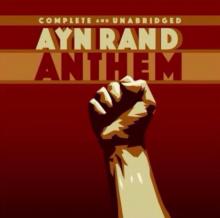 Anthem
Anthem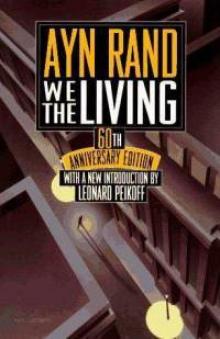 We the Living
We the Living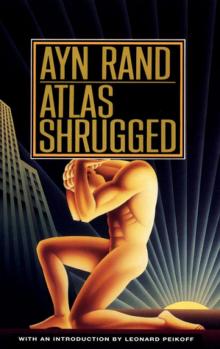 Atlas Shrugged
Atlas Shrugged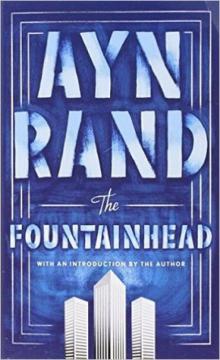 The Fountainhead
The Fountainhead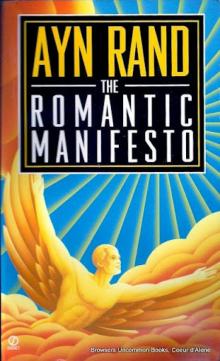 The Romantic Manifesto: A Philosophy of Literature
The Romantic Manifesto: A Philosophy of Literature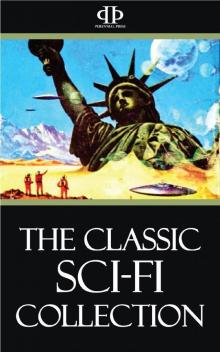 The Classic Sci-Fi Collection
The Classic Sci-Fi Collection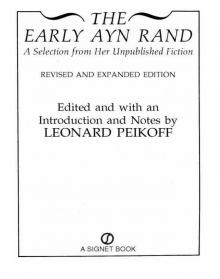 The Early Ayn Rand
The Early Ayn Rand